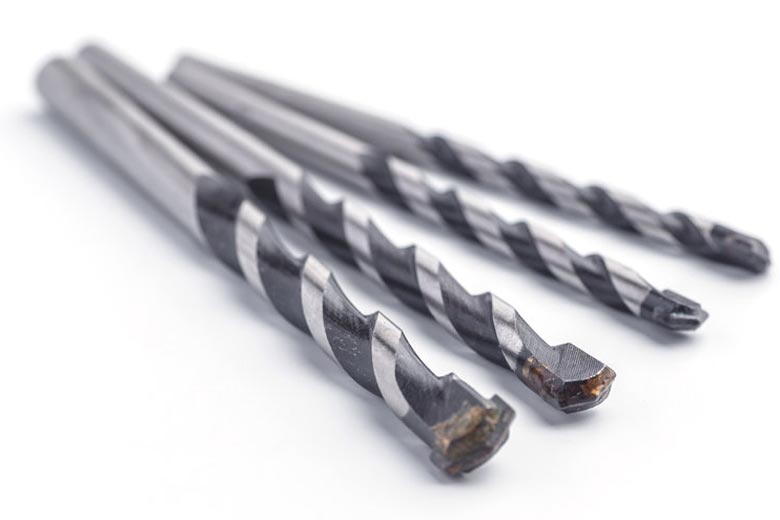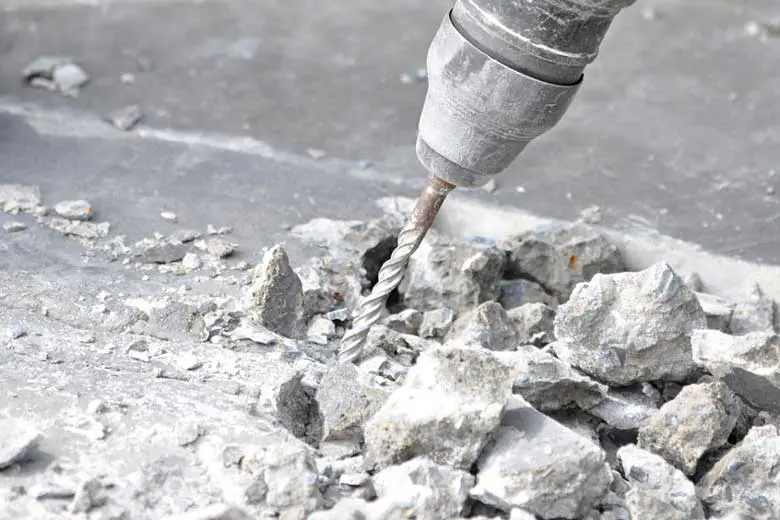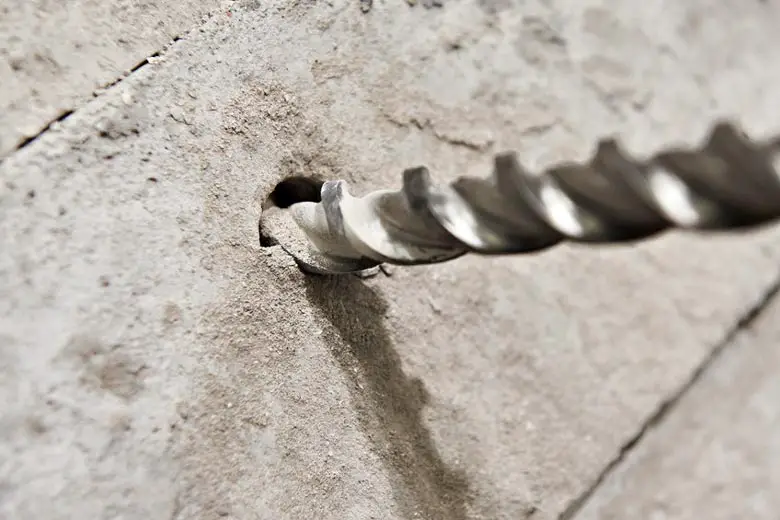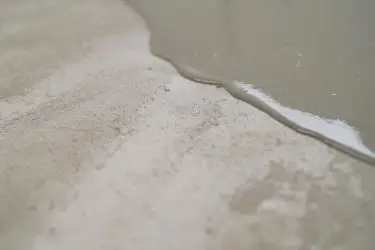There are so many options at the home improvement store, and drill bits are no exception. It can be overwhelming to try to find the right bit for the job. However, picking the right one is essential as some drills that work well on one material might work very poorly on another.
While it’s physically possible to use a titanium bit on concrete, you shouldn’t use them in this manner. You probably won’t put yourself in danger, but you’ll wreck your drill bit in the process. Since titanium drills aren’t cheap, save yours for drilling metal and wood.
Titanium drill bits bring speed and heat resistance to the drilling game. However, this is because of a titanium coating, and the construction of these bits isn’t conducive to using them on concrete.

Table of Contents
Titanium Coating
No matter what the drill bit’s name says, a titanium drill isn’t made of titanium. While titanium isn’t very rare, the extraction process is costly.
We can’t use any kind of carbon to extract titanium. If we were to do that, the two elements would bond and create titanium carbide, which is very brittle.
Therefore, we’re left with a chemical process that’s lengthy, costly, and highly wasteful — as much as 40% of raw titanium ends up as waste. So while titanium isn’t all that rare in the earth’s crust, it’s quite expensive.
Titanium drill bits are made of high-speed steel and coated with titanium, so the bit contains only a tiny amount of the element. High-speed steel comes in many forms, but the general idea is that high-speed steel is a strong alloy that resists abrasion and boasts a high level of hardness. The material is often used in cutting tools like saw blades and drill bits.
The titanium coating is known for being exceptionally strong and lightweight, but we use it as a coating for its ability to dissipate heat rapidly.
Titanium drill bits need to be heat resistant since drilling metal generates a lot of heat very quickly. Coating the bit in titanium serves this purpose well, and the strength of the material helps bolster the bit.
Sharp Bits for Concrete
Another issue people might have when using a titanium bit on concrete is the need for a sharp bit. Carbide-tipped drill bits known as masonry or concrete bits are made for drilling concrete, and they’re very sharp bits. The carbide tip is tough as old leather, too, so it takes quite a lot of use to dull it.
While titanium bits aren’t exactly dull, the metal under the coating isn’t titanium and isn’t intended for use on concrete. When you use it on concrete, the bit will quickly lose its sharpness. And herein lies the real issue: you can’t sharpen a titanium bit—you can, but you’ll soon ruin the bit, as sharpening it’ll remove the titanium coating.
Once your metal drill doesn’t have titanium on it, it’ll heat up much faster, especially when you use it on metal. Titanium bits already have something of a short lifespan. Using yours on concrete will only make it that much shorter.

A Titanium Alternative
You may be asking yourself why you want a titanium drill bit if its lifespan isn’t all that long.
Heat dissipation is a huge part of why we use titanium bits. Still, if you’re concerned about the titanium coating wearing off during use (rendering the bit useless), look into a cobalt drill bit like the ones in this Bosch Drill Bit Set, available on Amazon.com.
Rather than being coated, these bits are made of a metal alloy that includes cobalt. They’re made of high-speed steel and usually bear the mark of “HSS Co.”
Cobalt drill bits won’t lose their coating because they don’t have one. However, a trade-off comes in here. The metal alloy with cobalt in it is actually more brittle than high-speed steel free of cobalt, which means your bit will be more prone to chipping than your titanium drill bit.
Cobalt bits are also more expensive than titanium drill bits, and many people avoid the cost in favor of a bit with a coating on it. The coating eventually wears off, but until it does, the titanium drill bit will work hard for you, provided you use it on the materials for which it was intended.
Frequently Asked Questions
You may need more information than just a yes or no answer to the drill bit question, so here are some more common questions.
What Is the Best Drill Bit To Drill Through Concrete?
Drilling through concrete requires a concrete drill bit. These bits may have a tip made of widia — an extremely hard metal alloy. Because of the widia tip, concrete drill bits retain their sharpness longer. The sharper your bit when drilling through concrete, the better it will perform.
Masonry bits will work as well and are very similar. Most masonry bits have wide tips shaped like arrows, and those tips usually have carbide or tungsten on or in them. While titanium bits have sharp, pointed ends, the masonry bit is flared a little bit wider.
Masonry bits are for drilling through brick, stone, and tile. Because concrete shares many of the same physical properties as these materials, masonry bits will also work on concrete. Just know that there are drill bits made expressly for drilling concrete.

Can Titanium Drill Bits Go Through Stucco?
Stucco is like concrete, but it’s a little denser. As a result, drilling into it can present some difficulties.
Titanium drill bits shouldn’t be used on stucco because they’ll suffer the same kind of damage as using them on concrete. The bit will rapidly dull, and any sharpening you try will only render the bit useless.
Masonry bits are best for stucco, and because of the material’s hardness, you might even need to use those bits in a hammer drill. Some stucco has wire mesh in it, so no matter what drill bit you end up choosing, be aware of the possibility that you may encounter metal in the wall.
When Should You Use a Titanium Drill Bit?
Titanium drill bits aren’t well suited to your concrete drilling needs. Titanium bits are best for drilling metal since the coating sheds heat so well. Drilling wood and PVC also goes well with titanium bits.
Do Metal Drill Bits Work on Concrete?
Since nearly every drill bit is made of metal, metal drill bits work on concrete. However, the type of metal and the shape of the drill bit will affect how well your metal drill bit works.
Using a bit specified for concrete or masonry drilling will make your project go more smoothly, and your bit won’t likely be ruined. Investing in masonry or concrete bits will save your titanium bits so they can be used later on materials they’re better suited to drilling.
Conclusion
As with any project, having the right tool for the job makes all the difference. You can drill concrete with titanium drill bits. It’s certainly possible. But the process will be slow going, you’ll likely be unhappy with the holes the bits make, and you’ll dramatically shorten the life of your drill bit, if not kill it outright. Instead, it’s best to go with a purpose-built bit with a widia tip.
Take the time to decide the best bit for the job, then keep them separate in your toolbox. If you have a bucket full of all sorts of bits, you’ll have some hunting ahead of you.



